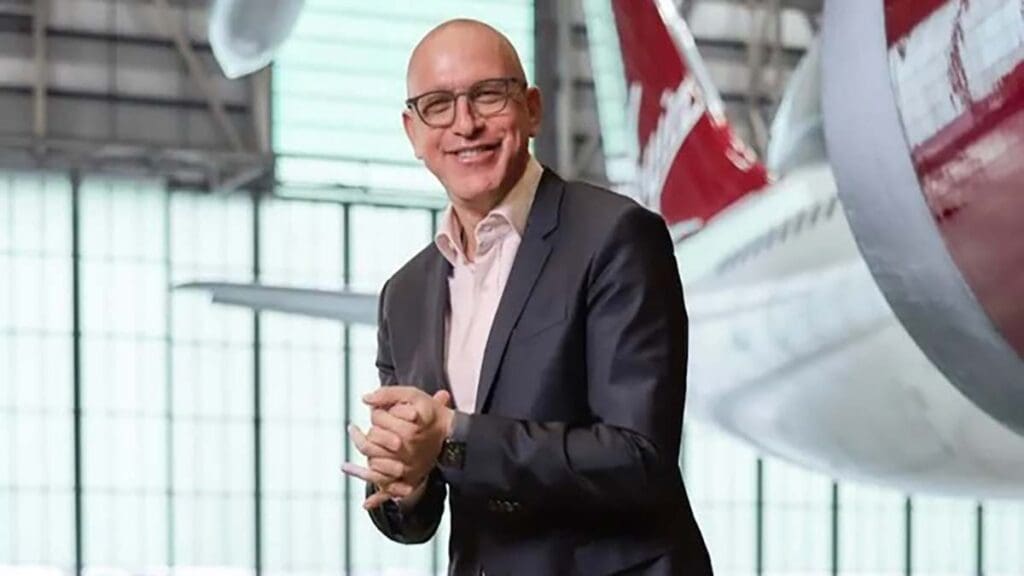When Shai Weiss reflects on Virgin Atlantic’s rollercoaster over the past five years, he does so with candour. “It’s been quite a ride,” he admits.
The airline posted its first profit since 2016—a modest £20 million before exceptional items—after a transformation that saw costs stripped back by £300 million annually. But for Weiss, profitability is only proof of survival; the bigger story is what Virgin Atlantic is becoming.
That story is one of bold investment in premium travel, in loyalty that looks very different from the rigid systems of the past, and in a willingness to rethink what corporate travel means in a post-pandemic world. “We cut deep, we streamlined,” Weiss says, “but we stayed true to our brand ethos. Now it’s time to build forward.”
The rebuilding starts in Virgin’s most lucrative cabins. Demand for premium travel has surged—last year, more than 90 per cent of Virgin’s Upper Class and Premium seats were filled. Weiss saw the signal clearly: double down on the front of the plane. The airline is retrofitting its Boeing 787s to increase Upper Class seats from 31 to 44 and boost Premium Economy capacity from 35 to 56, while cutting back in standard economy. “It’s bold,” he says, “but it lets us deliver a luxury experience that stands up to the best.”
This shift dovetails neatly with the rise of the bleisure traveller—the new hybrid flyer who blends business with leisure and expects to be rewarded accordingly. “The shift isn’t new, but it’s accelerating,” Weiss notes. As far back as 2021, he predicted business travel would return in a “new format” that blurred boundaries. Now that forecast is Virgin’s reality.
Central to that is loyalty. Virgin Atlantic’s Flying Club is undergoing a quiet revolution. Traditionally, frequent flyers were the only ones rewarded. Weiss wants to change that. “Even someone who flies just once a year—say London to the Caribbean—should feel valued,” he argues. The new model will reward long-term loyalty, even for infrequent travellers, by looking at multi-year flying patterns rather than rigid annual thresholds. “Think of it less like airline miles and more like a retailer’s points programme over time,” he explains. “Closer to a supermarket model—but for travel.”
For the bleisure audience—many of whom don’t clock up dozens of flights a year, but are fiercely loyal when they do travel—that change could be transformative.
The loyalty rethink is matched by an ambitious programme of investment in the travel experience itself. Virgin is the first UK airline to commit to free, streaming-quality Wi-Fi across its fleet, powered by Elon Musk’s Starlink satellites. By 2027, Flying Club members will be able to work or watch Netflix seamlessly in the sky. The carrier is also rolling out an AI-based concierge service, developed with OpenAI and Tomoro.ai, which will offer multilingual, emotionally intelligent support directly in the Virgin app. Add to that redesigned Clubhouses, refreshed amenity kits and menus, and the airline’s trademark cheeky service, and Weiss believes the Virgin difference will feel sharper than ever.
“Our purpose is to make customers smile,” he says. “That’s as true in a lounge in Heathrow as it is at 35,000 feet.”
Partnerships are also extending that promise. Virgin’s decision to join SkyTeam in 2023 broadened its global reach and loyalty offering overnight, allowing passengers to earn and redeem miles across an alliance that includes Air France, Delta, and Korean Air. For corporate travellers who need flexibility and seamlessness, it is a tangible boost. “Partnerships let us deliver value beyond our own network,” Weiss says. “That’s what loyalty should mean.”
If the strategy sounds expansive, it is tempered by Weiss’s philosophy of “paranoid leadership.” Aviation is a brutally competitive industry, and he makes no apologies for being watchful. “Being the underdog keeps us innovative and sharp,” he says. “We observe—BA’s results, customer trends—and we respond fast.”
That underdog mindset may just be Virgin Atlantic’s biggest asset. From the outside, the carrier appears to be surfing the same waves as the wider industry: premiumisation, sustainability, digitisation. But Virgin’s approach, shaped by Weiss’s mix of pragmatism and boldness, has its own flavour. It is less about chasing the frequent flyer of old and more about cultivating a new kind of loyalty—one that recognises bleisure travellers, premium leisure seekers, and loyalists who may not fly every week but who instinctively choose Virgin when they do.
“We exist to make people smile,” Weiss repeats, almost like a mantra. For him, corporate loyalty is no longer about miles in the bank but about affection in the brand. It is, fittingly, about love—the same four letters emblazoned on Virgin Atlantic’s aircraft tails, and the same feeling Weiss wants to inspire when business travellers next step on board.


